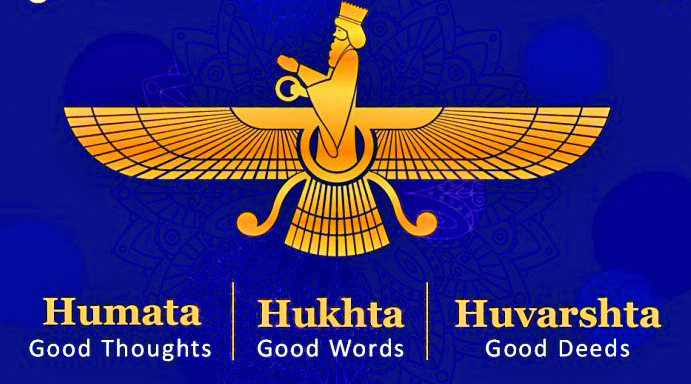Er. Adil J. Govadia
Humata, Hukhta, Huvarshta (HHH), the three Avestan words, encapsulate the ethical code of Zoroastrianism – these are considered a moral extension of a Mobed’s (priest) threefold professional deportment, required to perform his hallowed duty of worship efficiently with right intentions (thoughts), right pronunciations (words) and precise conduct of rituals (deeds) (Ref. ‘Zoroastrians, Their Religious Beliefs and Practices’ by Mary Boyce).
However, the threefold code of HHH is not as simplistic as it sounds. It needs to be understood allegorically, as explained in Yasna 19 – ‘Humata’ is said to be the first thought of Ahura Mazda, the thought for an evil-free cosmos. Thus, all thoughts leading to this goal are regarded as Humata. ‘Hukhta’ is used to describe words of Mathra Spenta or the words recited in Avesta / Pazand litanies. Thus, all oral utterances of Zoroastrian prayers can be referred to, as Hukhta or ‘good words’; whereas ‘Huvarshta’ is understood as all action that leads to bringing all God’s creations to their original pristine purity.
Since this ancient ethical code of HHH is doctrinally acknowledged by all Zoroastrians as Prophet Zarathushtra’s teachings, it not only acts as a unifying factor for the community but is also a source of pride on which is based their extensive philanthropy. However, over a period of time, the three-fold ethical code of conduct gained deceptive prominence and popularity due to the motivated agenda of some who radically try to oversimplify the ancient faith into three simple words of ‘good thoughts, good words and good deeds’. There is more than the threefold code to the founding principles of Zoroastrian religion.
This code of conduct is repeatedly referred to across all Zoroastrian scriptures, be it Yasna 57:14 wherein it states that a good man is defined as the one who is. “rich in good thoughts, words and deeds” (frayo humato, frayo hukhto, frayo huuarsto) or in Vendidad 5:21, which describes a good man to be the one, “who purifies himself through good thoughts, words and acts”. In Yasht 13:84, the seven great Ameshaspends or the archangels are perceived as meditating on, “good thoughts, words and deeds.” In Hadokht Nask 2.24-25, the Daena (angel), who meets the departed soul of a righteous man, identifies herself as his, ‘good thoughts, words and deeds’, based on which her beauty gets amplified. Thereafter, the soul is said to metaphorically ascend through the three stages of Humata, Hukhta, Huvarshta into eternal bliss (heaven).
The opposite of Humata, Hukhta, Hvarshta (‘good thoughts, good words and good deeds), is Dushmata, Duzhukhta, Duzhvarshta meaning “bad thoughts, bad words and bad acts,” as is recited in the Pazand litany Ahura Mazda Khodai (Kushti prayers) to ward off evil while clicking fingers. The threefold Avestan formula – Humata, Hukhta, Huvarshta – is however not to be confused with a similar threefold popular expression ‘Manashni, Gavashni, Kunashni’ which, unlike HHH, is in Pazand meaning ‘thoughts, words and deeds’ and devoid of the prefixed adjective ‘good’. It thus can either be ‘good’ or ‘bad’ depending upon man’s earthly conduct. The words, ‘Manashni Gavashni, Kunashni’ are also recited in the Kushti prayers – ‘az aan gunaah manashni gavashni kunashni……pa patet hom’ meaning “for all the sins of thoughts, words and actions…I am sorry”.
Hence, it needs to be reiterated that Zoroastrianism is based on the founding principle of ASHA – the meticulousness with which the Universe functions is due to the all-embracing Law of ASHA or the law of righteousness, order and balance, which is the foundational principle of the entire universe. It is only due to this absolute, irrefutable, unambiguous, uncompromising and unconditional virtuous law at every level of existence, be it corporeal, ethereal, mental, emotional, physical, meta-physical or spiritual, in thought, words and in deeds, that the universe is a cosmos and not chaos!
According to Zoroastrian philosophy, all occurrences and manifestations, even those that seem random or chaotic – such as sudden natural disasters, accidents and deaths – are not necessarily inadvertent as they occur in full accordance with the Law of ASHA (Ref Roni Khan’s ‘Is the Zarathushtrian Religion Universal?’). Therefore, as scripturally explained, ASHA is a great universal natural law of action and reaction, cause and effect, operating immortally and immutably throughout creation.
In fact, one of the pillars of physics: ‘to every action, there is an equal and opposite reaction’ (Newton’s Third Law of Motion) is a direct expression of the orderliness instituted by the Zoroastrian’s first and foremost Law of Creation – ASHA, which, in effect, is the summit of all morality, the pinnacle of all ethics! Hence, when balance in nature is disturbed or nature’s laws are broken, corresponding consequences inevitably follow.
